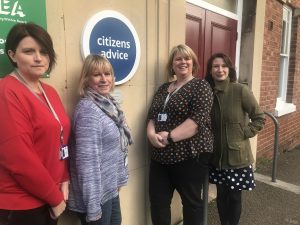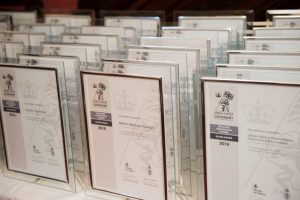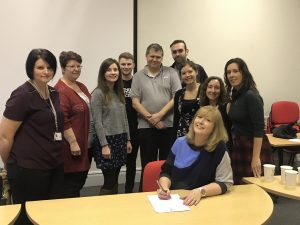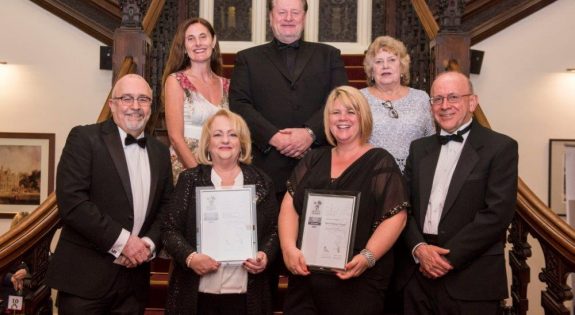News
February 13th 2019
Together Everyone Achieves More – The Covenant Partnership in Charnwood, Melton and Rushcliffe
In the East Midlands there are many Armed Forces Covenant projects in councils, non-profits and businesses but how do these projects run? And who is responsible for them?
Victoria Coomber is the Armed Forces Covenant Officer for the partnership of Charnwood, Melton and Rushcliffe Borough Councils. She has now been doing this role for almost two years and has discovered first-hand how the Armed Forces Covenant can make a real difference to communities. She is now sharing that beyond the Councils and the region by providing training and other resources related to the Armed Forces Covenant.

Victoria with the Citizens Advice Bureau Team
The project started like many others, with a breakfast club. Victoria explained: “I really liked the idea of a veteran’s breakfast club but we didn’t have one in Charnwood, where I initially worked. I went back to the board at Charnwood Borough Council and said I’d like to run one in my spare time, we set one up and it was really successful, we had about 80 veterans in week one. When I then fed back to the board, we thought ‘wow’ there are a lot more veterans then we ever imagined in this area, maybe we should be doing a lot more work.”
This discovery encouraged the Councils’ Armed Forces board to further look into ways that they could support the implementation of the Covenant. Victoria said: “When the Armed Forces Covenant trust fund announced the grants, the Charnwood group were really keen to apply for some funding for a Covenant officer. Melton, Charnwood and Rushcliffe border the Defence and National Rehabilitation Centre so it made sense for us to put a joint bid in, which the managers did, then I applied for the job and got it.”
Victoria’s work is supporting the three Councils to make sure that as an employer and as service providers they are working well to support the Armed Forces Community and the Covenant. To achieve a Silver Employer Recognition Award the three Councils have been introducing more and more human resources policies that will support their staff who are part of the Armed Forces Community. These include things like being more flexible with time off for family members of the Armed Forces who are deployed.

The Councils each recieved a Silver Award for their efforts
In order to do this Victoria has worked closely with other Armed Forces Covenant Officers from around the country. They host regular meetings where they can discuss issues and talk with experts from Armed Forces charities but it also helps shape policy in the Councils. Victoria explained: “When I wanted to introduce a guaranteed interview scheme, I went to my colleagues around the country and looked at their policy. Rather than re-inventing the wheel I could take this to our Human Resources teams and use it as a template to inform our own policy.”
In an effort to further encourage fair treatment for members of the Armed Forces Community, Victoria is working with each Councils key partner agencies, contractors and suppliers to ensure that they are Armed Forces aware. The Councils are running training sessions and providing advice and support to help teach these groups and their own staff about the Covenant.
Victoria explained: “Part of our ‘Getting to know you’ sessions with our agencies, partners and suppliers is about what pledges would work best for them. We are very conscious of who our audience is and try to tailor the sessions based on this.”
The work has progressed at pace and with a further grant from the Forces in Mind Trust, Victoria has expanded her remit, added an Outreach Worker, created a partnership with the local Citizen’s Advice Bureau and has encouraged other agencies in the local community to commit to the Covenant. Working with groups like the Royal British Legion, SSAFA and the Citizen’s Advice Bureau has made signposting help for veterans easier.
The Citizen’s Advice Bureau’s Armed Forces expert and the Royal British Legion have created a new way of working. These groups are encouraged to work more closely together in order to ensure that the needs of members of the Armed Forces Community are met.

One of the partner agencies, Let’s Live Well in Rushcliffe signing the Covenant
Victoria explained: “The Citizen’s Advice Bureau’s Armed Forces expert is now supporting the Royal British Legion Case Officer locally and helping with elements such as Personal Independence Payment application forms and other benefits because it helps free up their time. They also work closely together and meet regularly to keep on top of cases. It’s a great example of partnership working.”
The latest expansion for the project is the introduction of mobile hubs that will help reach members of the Armed Forces Community in the more remote areas. Victoria said: “What we identified through our mapping exercise is that breakfast clubs are great for meeting veterans but the majority of veterans are in their 70s and 80s they weren’t coming to the clubs. We also felt that early service leavers were not attending our local Breakfast Clubs. Research shows us these are a vulnerable group of veterans with potentially an unmet need.
“We are going to village halls, pubs, post offices where we can offer advice. We can then find people in the community that we can train and upskill to provide information when we can’t be there. These will become community Armed Forces Champions. It’s a challenge and is very labour intensive but we are opening up new support and existing resources to previously hidden veterans.”
The future of the project has also been guaranteed despite the ending of the funding in the near future. Victoria concluded: “The funding will come to an end but the hope is that the work we have done so far is sustainable, a lot of what we’ll be looking at is training others to continue this level of service provision and ensuring that all the necessary policies are in place before the funding ends.”
“The Citizen’s Advice Bureau’s Armed Forces expert is now supporting the Royal British Legion Case Officer locally and helping with elements such as Personal Independence Payment application forms and other benefits because it helps free up their time. They also work closely together and meet regularly to keep on top of cases. It’s a great example of partnership working.”

